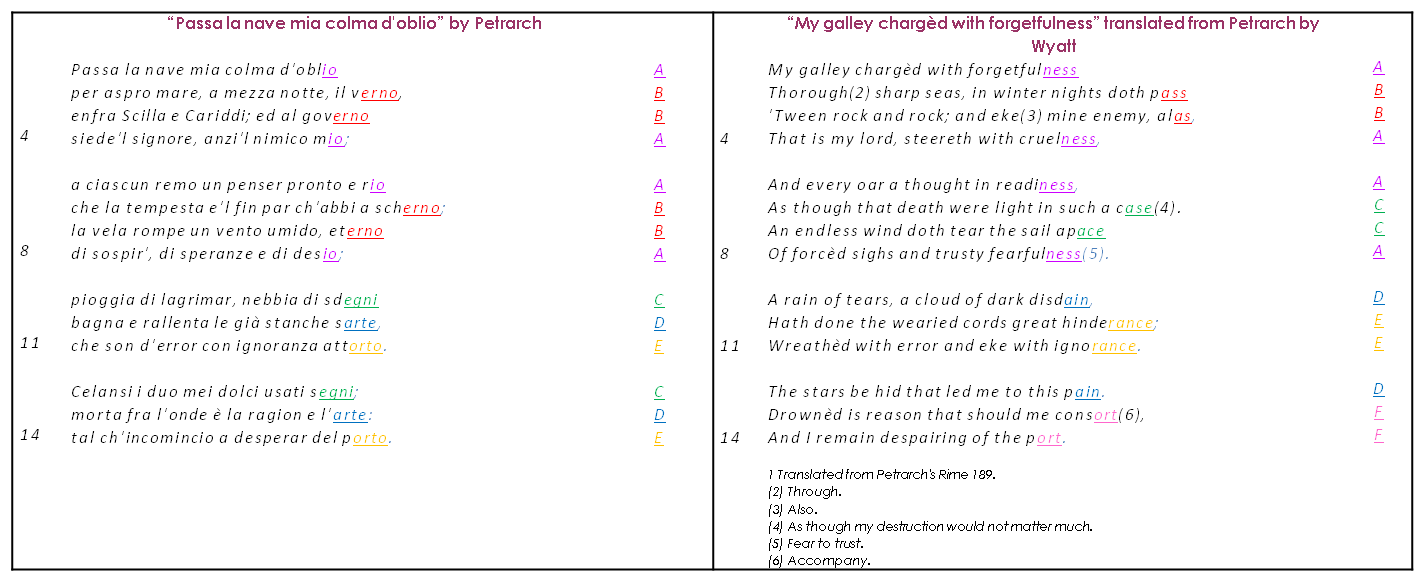Textuality » 4A Interacting

The first poem was written by Petrarch and it belongs to the collection of sonnets called "Il canzoniere", the second is a translation of it, written by Wyatt, an English sonneteer. Having a look at the layout, the reader can easily understand that they're sonnets, in fact they are arranged into 2 quatrains and 2 triplets (this lets us also know that they follow Petrarch's model). Wyatt, translating the poem, has kept the structure used by Petrarch, although there are some alterations due to the differences between English and Italian, and the stylistic choices made by him.
The rhyme-scheme is different (although both of them have 2 initial quatrains with linking rhymes) and we can see variations also on the choice of the words.
At line 1, the reader fins out that instead of using the word "ship" to translate the Italian "barca", the authors uses the word "galley", maybe because a galley was a ship used during wars, and the character is facing a hard situation. "Oblio" is translated with "forgetfulness", a term that is more concrete and specific, and represents the will of the speaker of forgetting the whole situation.
Going on with the reading of the two poems, we notice that, at line 3, Wyatt translates "Scilla and Cariddi" with a more general "between rock and rock", this probably to describe the difficult condition the ship is facing.
Furthermore, Wyatt doesn't define his lord as his enemy, he prefers saying only that he is a cruel man.
At line 6, the reader understands that the desperation of the speaker is stronger in Wyatt translation as the author says that the character almost thinks that death is better than life, in this kind of situations. Maybe he is almost thinking about committing suicide. This isn't said in Petrarch's sonnet.
At line 8, Wyatt says that his sighs are forced and his fear is trusty. Petrarch only spends few words saying that they are like a wind that breaks the sails of his soul.
At line 9, Petrarch says that the disdain is similar to a fog; Wyatt prefers comparing it to a dark cloud, using a more concrete image that represents the oppressive situation the speaker is facing.
At lines 10-11, Petrarch says that the wind is slowing down the ship; Wyatt instead, says that is almost like an obstacle that stops it and envelops it with mistakes and ignorance.
At line 12 Petrarch refers only to two signs that were the sweetest for him, Wyatt, instead, defines the two signs as the stars that led him to such a situation. The reader understands from this, that reason which is so important for the character of Petrarch's sonnet is reason of pain for the speaker in Wyatt's poem.
Both of the sonnet end with a sentence that shows all the lack of hope of the two people that are speaking. They both are afraid they will never reach a safe place and peace.
The syntax of the two poems is similar, despite the differences between the two languages: there are reverses and enjambments that contribute to create a sense of disorder and confusion that characterizes the mind and soul of the poet, the sound devices used by Wyatt, however, contribute to create a sensation of quietness.
The language used is, as we said before, more concrete for Wyatt, as also English language is more concrete than Italian.
In conclusion, the two works evoke in the reader's mind an idea of confusion and affliction that is the same that troubles the writer. We don't immediately understand what is happening, but we immediately share the feelings of the speaker and we feel the same lack of points of reference.